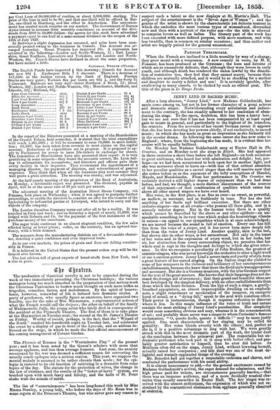JENNY LIND IN SACKED MUSIC.
After a long absence, "Jenny Lind," now Madame Goldschmidt, has again come among us, but net in her former character of a great actress and dramatic singer. Notwithstanding every solicitation and induce- ment to the contrary, she has steadily adhered to her resolution of aban- doning the stage. To the opera, doubtless, this has been a heavy loss; but we are not sure that it has not been compensated by at least equal gain to music in general, and particularly to the highest of its branches,. the oratorio. From the accounts of her recent German career it appears that she has been devoting her powers chiefly, if not exclusively, to sacred. music ; in which she has made as great an impression as she formerly did in the secular drama. In following the same career she has now come to. England ; where, from the beginning she has made, it is evident that her course will be equally brilliant.
On Monday last Madame Goldschmidt sang at Exeter Hall in The Creatian, and on Monday next she sings in Elijah. She had appeared in these oratorios a short time before she left England—on both occasions to great audiences, who heard her with admiration and delight ; but, per- haps—as we had been accustomed to look upon her in another light, and she was moreover about to leave us—swith lees of that critical attention to her peculiar qualities as a sacred singer than she will receive now that she comes before us as the exponent of the lofty conceptions of Handel, Haydn, and Mendelsohn. From her performance in The Creation we certainly derived a still higher degree of enjoyment than we had done before, and had, we thought, a more distinct discernment of the sources of that enjoyment—of that combination of qualities which raises her above all other sacred singers we have ever heard.
Her voice, in the first place, is as fine as ever—as sweet, as powerful, as mellow, as resonant, and as faultlessly in tune. Nor has she lost anything of her facile and brilliant execution. But there are other oratorio-singers—one at all events—who possess all these gifts, and in a scarcely inferior degree. But in the human voice there is a quality which cannot be described by the above or any other epithets—an un- speakable something in its very tone which makes the heartstrings vibrate in unison—an appeal to our sympathies which is at once acknowledged; we are moved because the sound is full of emotion. Every one Las felt this from the voice of a singer, and it has never been more deeply felt than from the voice of Jenny Lind. Another quality, akin to the last, but shown also in other ways, is her earnestness. Not only in the tones of her voice and in the expression of every word, but in her looks, her air, her abstraction from every surrounding object, we perceive that her whole teal is rapt in the thoughts and feelings to which, she gives utter- ance. In this we recognize a peculiarity of John Ersham, the greatest of oratorio-singers, who was never knownin the orchestra to utter a light word or use a careless gesture. Jenny Lind's severe taste and purity of style form a great feature of her sacred singing. Op the Italian stage she yielded to. nones of her compeers in the richness and brilliancy of her extemporaneous for the text of the great masters. She knows that their language does not de- mand the foreign aid of ornament ; that their grand and beautiful ideas are best developed by the simplest delivery, with no other embellishments than those which the heart dictates. From the lips of each a singer, it gently- breathed appogiatura, an almost imperceptible dwelling on an emphatic note, e slight retardment or acceleration of the measure, an energetic' burst of wound, or a " dying fall," speak to the soul with resistless effect. Their power is instantaneous, though it requires reflection to diecover where it lies. In this magic influence of the voice of truth and nature consists the most striking of Jenny Lind's peculiarities. Her simplicity would seem something obvious and easy, whereas it is the consummation of art; and probably there never was a singer to whom Cariasimi's famous exclamation, " 0, questo facile, quanto 6 difficile ! " may be more justly applied. One more characteristto of her singing may be called its geniality. Her voice blends sweetly with the others ; and, perfect as she is, it is a positive advantage to sing with her. We were greatly struck with this in the most dramatic part of the work, the tender duet at the conclusioa between the prlinseval pair. The respectable but un- dramatic performer who took part in it sang with better effect, and pro- bably greater satisfaction to himself, than he ever did before. As Malibran often did on the stage, Jenny Lind, without lowering herself, actually raised her companion • and this duet was one of the most de- lightful and warmly-applauded of the evening.
Mr. Benedict had got together a respectable orchestra and chorus, and conducted the performance with his usual ability.
It is almost unnecessary to add,—for the general excitement caused by Madame Goldschmidt's arrival, the eager demand for admissions, and the high prices paid for tickets, are circumstances generally known,—that there was an immense audience, and of a more decidedly musical cha- racter than usually assembles in Exeter Hall. The fair singer was re- ceived with the utmost enthusiasm, the expression of which was not re- strained by the conventioual abstinence from applanse generally observed gt orate) os. tit tbtatrts I embellishments, because she knew that there the florid style was appropriate
and necessary. But she is a German musician, with the true German respect


































 Previous page
Previous page